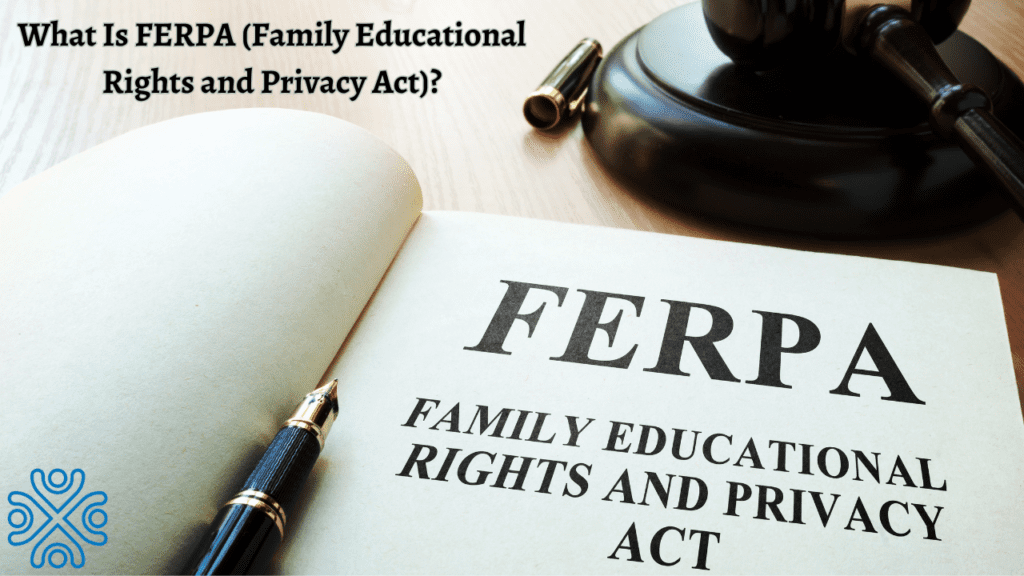Authored by Dr. Leland Jaffe, Associate Dean, and Professor; Published on June, 10th, 2024
In higher education, maintaining student privacy and confidentiality is paramount to fostering a safe and secure learning environment. The Family Educational Rights and Privacy Act (FERPA) is important legislation in safeguarding students’ rights to privacy and protecting the confidentiality of their educational records. In this blog post, we’ll discuss the definition of the FERPA, its key provisions, and why it holds critical importance in higher education.
What is FERPA – General Information?
FERPA, enacted in 1974, is a federal law designed to protect the privacy of student education records. Under FERPA, educational institutions that receive federal funding, such as colleges and other educational institutions, are required to establish and maintain policies and procedures to ensure the confidentiality of students’ academic records. These records include personal information, such as grades, transcripts, dates of attendance, disciplinary records, and financial aid information.
Key Provisions of FERPA (Buckley Amendment)
1. Rights of Parents and Eligible Students
Access to Records:
Parents of students or eligible students (those who are 18 years or older or attending a postsecondary institution) have the right to inspect and review the student’s education records maintained by the school.
Amendment of Records:
Parents or eligible students have the right to request the amendment of the student’s education records if they believe they are inaccurate, misleading, or in violation of the student’s privacy rights.
Consent for Disclosure:
Schools must have written permission from the parent or eligible student to release any information from a student’s education record. However, FERPA allows schools to disclose records without consent to certain parties or under specific conditions (e.g., school officials with legitimate educational interest, other schools to which a student is transferring, specified officials for audit or evaluation purposes, financial aid, accrediting organizations, compliance with a judicial order or lawfully issued subpoena, and in case of health and safety emergencies).
2. Directory Information
Schools may disclose, without consent, “directory” information such as a student’s name, address, telephone number, date and place of birth, honors and awards, and dates of attendance. However, schools must inform parents and eligible students about directory information and allow them a reasonable amount of time to request that the school not disclose directory information about them.
3. Annual Notification
Schools are required to notify parents and eligible students annually of their rights under FERPA. The actual method of notification (e.g., special letter, inclusion in a PTA bulletin, student handbook, or newspaper article) is left to the discretion of each school.
What Grade Levels Does FERPA Pertain to?
FERPA pertains to all levels of education that receive funding from the U.S. Department of Education. Specifically, it applies to:
Elementary Schools:
FERPA covers all public and private elementary schools that receive federal funding. This includes kindergarten through fifth or sixth grade, depending on the school district.
Middle Schools:
The law also applies to middle schools (sometimes called junior high schools), typically covering grades six through eight, though the exact grade range can vary by district.
High Schools:
FERPA covers high schools, generally including grades nine through twelve.
Postsecondary Institutions:
The law applies to all postsecondary institutions, including community colleges, universities, and vocational schools, that receive federal funding. This includes both undergraduate and graduate programs.
FERPA grants specific rights to parents of students in these educational levels and, upon reaching the age of 18 or attending a postsecondary institution, to the students themselves (referred to as “eligible students”). These rights include access to educational records, the right to request the amendment of records and some control over the disclosure of information from the records.
In summary, FERPA applies to all educational institutions from elementary through higher education that receive federal funds.
Parental Rights When a Student Turns 18 or Attends Post-secondary Institution:
When a student turns 18 years old or enters a post-secondary institution (college, trade, graduate school) at any age, the rights under FERPA transfer from the parents to the student. However, parents may still have access to the records if:
- The student is a dependent for tax purposes.
- There is a health or safety emergency involving the student.
- The student gives written consent.
Importance of FERPA in Higher Education:
FERPA plays a crucial role in upholding students’ rights to privacy and protecting the confidentiality of their educational records. By ensuring the confidentiality of sensitive information, FERPA helps build trust between students and educational institutions and fosters a safe and supportive learning environment. Moreover, FERPA empowers students to maintain control over their education records, promoting autonomy and accountability in their academic pursuits. Additionally, compliance with FERPA regulations is essential for educational institutions to maintain eligibility for federal funding and avoid potential legal repercussions.
Here is a list of examples of FERPA violations:
1. Unauthorized Disclosure:
Sharing a student’s grades or academic progress with anyone other than the student or authorized individuals without written consent of the student. Discussing a student’s academic performance in a public setting where others can overhear.
2. Improper Posting:
Posting grades publicly with the student’s name or identifiable information. Displaying student IDs, social security numbers, or other personal information in public areas.
3. Unauthorized Access:
Allowing unauthorized personnel to access student records. Faculty or staff accessing student records without a legitimate educational interest.
4. Inadequate Data Protection:
Failing to secure electronic student records against hacking or unauthorized access. Leaving physical records unsecured in easily accessible areas.
5. Improper Handling of Data:
Sending sensitive student information via unsecured email or other unprotected electronic means. Failing to properly dispose of documents containing student information, such as throwing them in a regular trash bin instead of shredding them.
6. Disclosure to Third Parties:
Sharing student information with external parties, such as researchers or marketers, without proper consent. Providing student directory information to third parties without ensuring they meet the criteria for “legitimate educational interest.”
7. Failure to Provide Access:
Denying students or parents the right to access and review the student’s educational records within the required timeframe.
8. Incorrect Handling of Student Requests:
Ignoring or improperly handling a student’s request to amend their educational records. Failing to document and manage requests for non-disclosure of directory information
9. Inadequate Training:
Failing to provide adequate training for faculty and staff on FERPA compliance and proper handling of student records. Not updating training materials or sessions to reflect changes in FERPA regulations.
Understanding FERPA: A Guide for Faculty Members
As faculty members, it is crucial to understand FERPA to ensure that you are compliant with the law and respectful of students’ rights. FERPA grants students several rights regarding their educational records: the right to access their records, the right to request an amendment to their records, and the right to have some control over the disclosure of personally identifiable information from these records.
FERPA’s primary mandate is that educational institutions must have written permission from the student to release any information from a student’s education record. However, there are some exceptions to this rule. For instance, school officials with legitimate educational interests can access these records without prior consent. Additionally, in certain situations, such as health and safety emergencies or compliance with a judicial order, information can be disclosed without the student’s consent.
Faculty Members Must Be Careful With Student Information
As faculty members, you must be vigilant in handling student information. This means not disclosing grades, personal identifiers, or any other confidential information to unauthorized individuals. Even within the academic environment, sharing information should only occur when there is a legitimate educational interest. For example, discussing a student’s performance with colleagues is permissible if it directly relates to educational needs but sharing it with other students or outside parties without consent is a violation.
FERPA Pertains To Digital Records Too
Moreover, faculty should also be aware of FERPA’s regulations concerning digital records. With the increasing use of online learning platforms and digital communication, it is important to ensure that any electronic records are stored securely and that sensitive information is shared only through protected channels. Faculty members should be trained on the institution’s policies for digital data management to prevent unauthorized access or breaches of student information.
Understanding and adhering to FERPA guidelines not only ensures compliance with federal law but also fosters an environment of trust and respect between students and faculty. By maintaining the confidentiality of student records, faculty members play a critical role in upholding students’ rights and supporting their educational journey.
Addressing a FERPA Violation: Steps to Take
In the unfortunate event of a FERPA violation, it is crucial to act swiftly and appropriately to mitigate any potential harm and to comply with legal obligations. The first step is to immediately notify your institution’s designated FERPA compliance officer or legal counsel. This initial notification should include detailed information about the nature and extent of the violation, the types of information disclosed, and the individuals involved. Early reporting allows the institution to assess the situation, provide guidance, and initiate any necessary investigative or remedial actions.
Once the institution is informed, a thorough investigation should be conducted to determine the scope and cause of the violation. This investigation may involve interviewing the parties involved, reviewing policies and procedures, and examining any relevant documentation or communication. The goal is to identify how the breach occurred and to prevent future incidents. During this process, it is essential to document all findings meticulously and to maintain transparency with affected students, informing them about the breach and the steps being taken to address it.
Corrective Measures Should Be Implements To Avoid Future FERPA Violations
After identifying the cause of the violation, the institution should implement corrective measures. This may involve providing additional FERPA training for faculty and staff, revising policies and procedures to strengthen data protection, and enhancing security measures for both physical and digital records. The institution should also consider offering support services to affected students, such as counseling or academic assistance, to address any potential impact on their education.
Additionally, it is important to understand that FERPA violations can have significant legal and financial repercussions for educational institutions. The Department of Education has the authority to enforce FERPA and may impose penalties, including withholding federal funding, if violations are not adequately addressed. Therefore, taking proactive steps to prevent FERPA violations through regular training, clear communication of policies, and robust data protection practices is essential for compliance and for safeguarding students’ rights.
By promptly addressing FERPA violations and implementing preventive measures, institutions can demonstrate their commitment to protecting student privacy and maintaining a secure educational environment. This not only upholds the law but also fosters trust and confidence among students, faculty, and the broader academic community.
Misconceptions Regarding FERPA: Clarifying Common Myths
Numerous misconceptions about FERPA persist among educators, administrators, and even students. One prevalent myth is that FERPA prohibits all sharing of student information without explicit consent. While FERPA does indeed emphasize the confidentiality of student records, it allows for certain exceptions where information can be disclosed without consent. For instance, school officials with legitimate educational interests, or in cases of health and safety emergencies, can access relevant student information. Understanding these exceptions helps educators navigate FERPA’s requirements while ensuring student safety and institutional efficiency.
FERPA Is Much Broader Than Most Believe
Another common misconception is that FERPA only applies to academic records such as grades and transcripts. In reality, FERPA’s scope is much broader and encompasses any information that directly relates to a student and is maintained by an educational institution or a party acting on its behalf. This includes disciplinary records, financial information, and even certain types of electronic communications. Misunderstanding this can lead to inadvertent violations, especially in an era where digital record-keeping is prevalent. By recognizing the full range of records protected under FERPA, institutions can better safeguard student privacy and avoid unintended breaches.
FERPA and Parental Rights
Furthermore, there is often confusion regarding the rights of parents and eligible students under FERPA. Many believe that once a student turns 18 or attends a postsecondary institution, parents lose all access to their educational records. While it is true that these rights transfer to the student at this point, parents may still access records if the student is a dependent for tax purposes. Additionally, educational institutions can inform parents if the student, under 21, has violated any law or policy concerning the use or possession of alcohol or a controlled substance. Clarifying these nuances ensures that both students and parents understand their rights and responsibilities under FERPA, fostering a more informed and compliant educational environment.
By addressing these misconceptions and providing clear, accurate information about FERPA, educational institutions can better protect student privacy, comply with legal requirements, and create a culture of transparency and trust. Regular training sessions and accessible resources on FERPA are essential for keeping all stakeholders informed and aligned with the law’s intent and provisions.
Maintaining FERPA compliance is a shared professional responsibility that involves the concerted efforts of various stakeholders within educational institutions. Primarily, school administrators and the registrar’s office must ensure that policies and procedures are in place to protect the confidentiality of student records. Faculty members and staff also play a crucial role, as they must be diligent in handling and sharing student information per FERPA guidelines.
Additionally, IT departments are responsible for securing electronic records and ensuring that data systems are protected against unauthorized access. Students and parents, too, should be informed about their rights under FERPA to actively participate in safeguarding their personal information. Ultimately, fostering a culture of compliance requires continuous education, clear communication, and vigilance from everyone involved.
FERPA Protections for Former Students
FERPA rights continue to apply to a student’s educational records even after they are no longer enrolled in an institution. This means that the institution must still maintain the confidentiality and privacy of the educational records of former students. The key points include:
1. Access to the Student’s Education Records:
Former students have the right to access their educational records maintained by the institution. They can request to review their records and obtain copies, though the institution may charge a fee for copies.
2. Consent for Disclosure:
Institutions must still obtain the former student’s consent before disclosing personally identifiable information from their educational records to third parties, except in circumstances allowed by FERPA without consent (such as disclosure to school officials with legitimate educational interests, in connection with financial aid, or as part of a health or safety emergency).
3. Amendment Requests:
Former students have the right to request amendments to their educational records if they believe the information is inaccurate, misleading, or in violation of their privacy rights. The process for requesting amendments is the same as for current students.
4. Directory Information:
Institutions may disclose directory information about former students without consent, provided they have followed the proper procedures for defining and disclosing directory information and the former student has not opted out of such disclosures.
Example Scenarios:
- Accessing Transcripts: A former student can request their transcripts from the institution, and the institution must provide access to these records.
- Employment Verification: If an employer requests verification of a former student’s degree or attendance, the institution must have the former student’s consent unless it falls under an exception allowed by FERPA.
- Record Corrections: If a former student finds an error in their educational records, they can request the institution to correct it.
Importance of Compliance With FERPA:
Ensuring FERPA compliance for former students is crucial for maintaining the institution’s reputation and avoiding legal issues. Institutions must have policies and procedures in place to handle educational records properly, regardless of the student’s current enrollment status.
In summary, FERPA rights do not expire upon graduation or after the student leaves the institution. Educational institutions must continue to uphold these protections and handle former students’ records with the same care and confidentiality as they do for current students.
Potential Consequences of a FERPA violation
Penalties for Educational Institutions:
- Loss of Federal Funding: The most severe penalty for an institution is the potential loss of federal funding. The U.S. Department of Education’s Family Policy Compliance Office (FPCO) can enforce this penalty if an institution is found to be non-compliant with FERPA regulations.
- Formal Complaints and Investigations: When a violation occurs, individuals can file a complaint with the FPCO. The FPCO will investigate the complaint, and if the institution is found to have violated FERPA, it must take corrective actions to comply with the regulations. Failure to address and correct the violations can lead to more serious consequences.
- Reputation Damage: Apart from legal penalties, institutions may suffer reputational damage. A FERPA violation can erode trust among students, parents, and the public, potentially impacting enrollment and funding.
Penalties for Individuals:
- Employment Consequences: Employees of educational institutions who violate FERPA may face disciplinary actions from their employer, including reprimands, suspension, or termination. The specific consequences depend on the institution’s policies and the severity of the violation.
- Legal Actions: While FERPA itself does not provide for a private right of action (meaning individuals cannot sue for damages under FERPA), other state or federal privacy laws may allow for lawsuits if personal data is mishandled.
FERPA Law – Conclusion
In an era marked by growing concerns over data privacy and security, FERPA rights remain a cornerstone legislation in safeguarding students’ rights to privacy and protecting the confidentiality of their educational records. By upholding the key provisions of FERPA and prioritizing compliance with its regulations, educational institutions can demonstrate their commitment to respecting students’ privacy rights and fostering a culture of trust and accountability in higher education.







